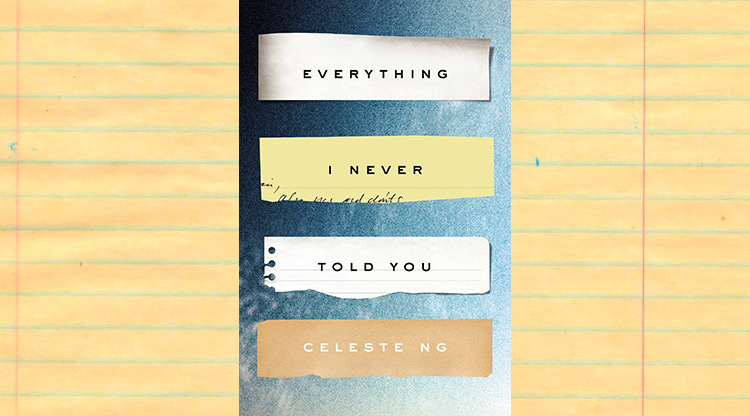Celeste Ng’s debut novel Everything I Never Told You: A Novel has been at the top of many best books of 2014 lists — and for good reason. It’s a quick read, without feeling cheap. It’s a mystery, without falling into genre. It’s a critique of race in the United States, without sounding shrill or academic.
The small Ohio college town in 1977 in which the Lee family lives will feel familiar to any Asian child who grew up in the Midwest. The story opens with the stark sentence “Lydia is dead. But they don’t know this yet.” Starting from a description of a very ordinary family breakfast, Ng gives us glimpses into the world created by the marriage of Marilyn and James Lee.
The couple meets at Harvard, where Chinese American James is a Ph.D. student and Marilyn, who is white, is his student. Their whirlwind romance leads to a shotgun wedding in 1958, in a sly nod to Loving v. Virginia. When Marilyn’s mother, a Southern white single-mother, meets James on the wedding day, she pulls her daughter aside.
It would have been easier if her mother had used a slur. It would have been easier if she had insulted James outright, if she had said he was too short or too poor or not accomplished enough. But all her mother said, over and over, was, “It’s not right, Marilyn. It’s not right.” Leaving it unnamed, hanging in the air between them.
These doubts about the suitability of an interracial marriage and the inability of society to grasp mixed-race identity pop up over and over throughout the novel. In the 1970s Midwestern town Ng conjures up, there are only white and not white. There are so many aspects of this novel I can’t stop thinking about, from the threads of Betty Crocker homemaker versus 1970s feminism to the deft way Ng has crafted the details to unfold in sort of a spiral fashion. But I am most interested in the undercurrent of interracial marriage, assimilation and mixed-race identity. The Lees hapa children, Nath, Lydia and Hannah, are most often categorized by their neighbors as Asian, from a woman at the grocery store who congratulates herself for guessing correctly that they are Chinese:
‘I knew it,’ she said. ‘By the eyes.’ She’d tugged the corner of each eye outward with a fingertip.
Even Lydia, who has improbably inherited her mother’s blue eyes, is described by the local newspaper as an “Oriental girl” and the same paper goes on to publish sidebars about the difficulties of growing up mixed.
Perhaps one of the most pointed commentaries on race come in the way the local police treat the Lee family, in their investigation (or lack thereof) of Lydia’s death. Finally, after a cursory investigation rules Lydia’s drowning to be a suicide, Marilyn says “If she were a white girl, they’d keep looking.”
But Everything I Never Told You: A Novel is not a morality tale of the dangers of racism. The characters are quite flawed, making me wonder whether James and Marilyn are simply very naive or willfully in denial of race. While the term “color-blind” is never used in the book, Ng’s expositions show, rather than tell, the dangers (particularly to those non-white) of believing that race doesn’t matter.
It’s not exactly an uplifting book, but one I couldn’t put down.

I received a review copy of “Everything I Never Told You”. Purchases made through the Amazon links in this post may help HapaMama earn a commission.


[…] Source: hapamama.com […]